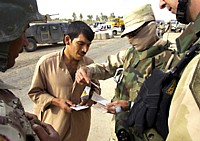Perspective: Few Iraqis Gain U.S. Sanctuary
 An Iraqi interpreter for U.S. forces keeps his face covered to protect his identity
An Iraqi interpreter for U.S. forces keeps his face covered to protect his identityBAGHDAD, Jan. 1 — With thousands of Iraqis desperately fleeing this country every day, advocates for refugees, and even some American officials, say there is an urgent need to allow more Iraqi refugees into the United States.
Until recently the Bush administration had planned to resettle just 500 Iraqis this year, a mere fraction of the tens of thousands of Iraqis who are now believed to be fleeing their country each month. State Department officials say they are open to admitting larger numbers, but are limited by a cumbersome and poorly financed United Nations referral system.
“We’re not even meeting our basic obligation to the Iraqis who’ve been imperiled because they worked for the U.S. government,” said Kirk W. Johnson, who worked for the United States Agency for International Development in Falluja in 2005. “We could not have functioned without their hard work, and it’s shameful that we’ve nothing to offer them in their bleakest hour.”
Read the rest at the NY Times

<< Home